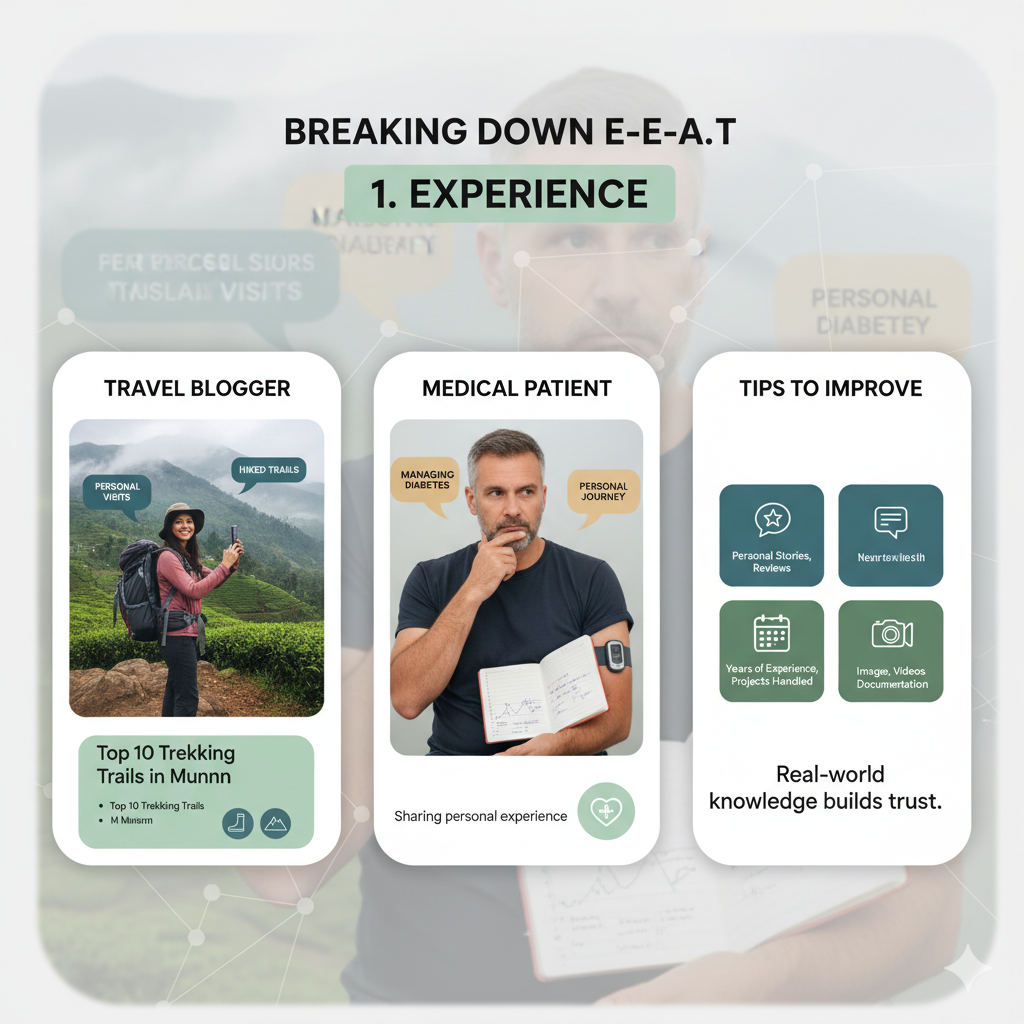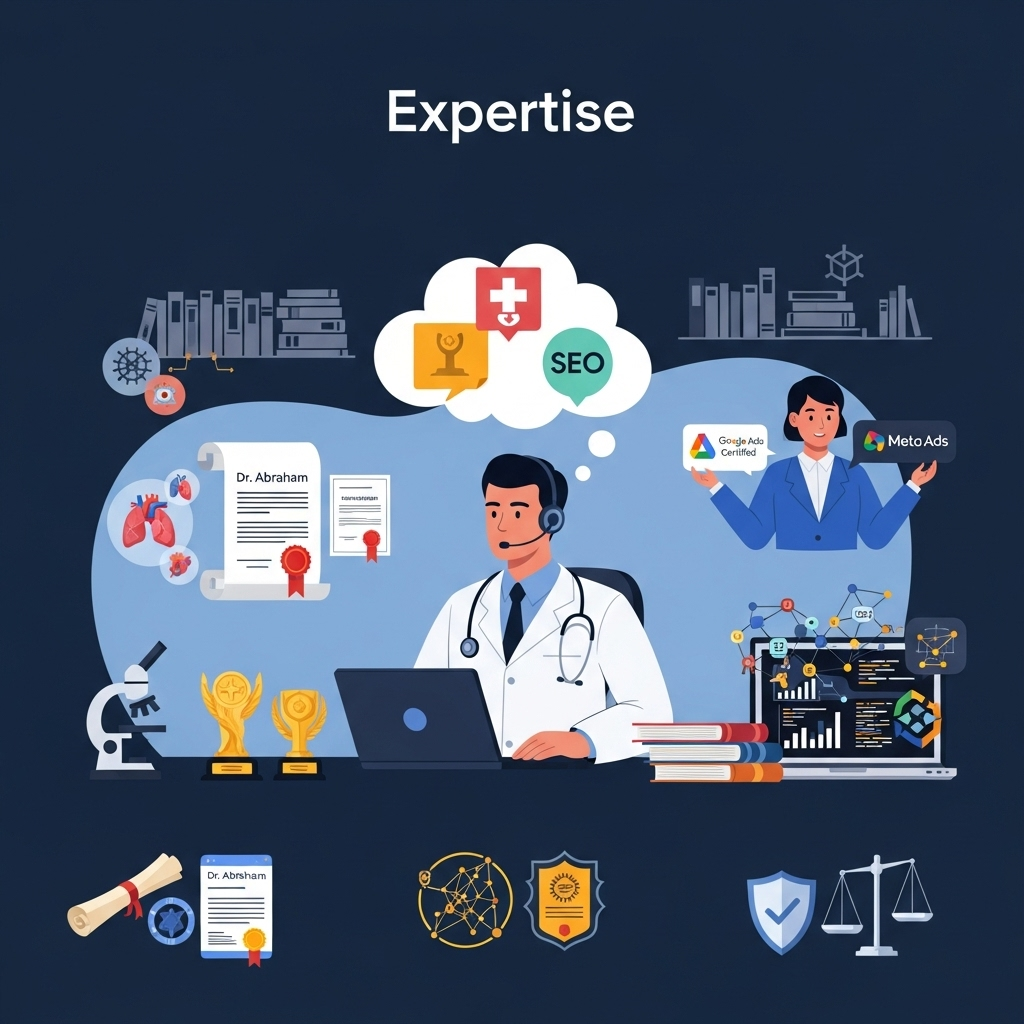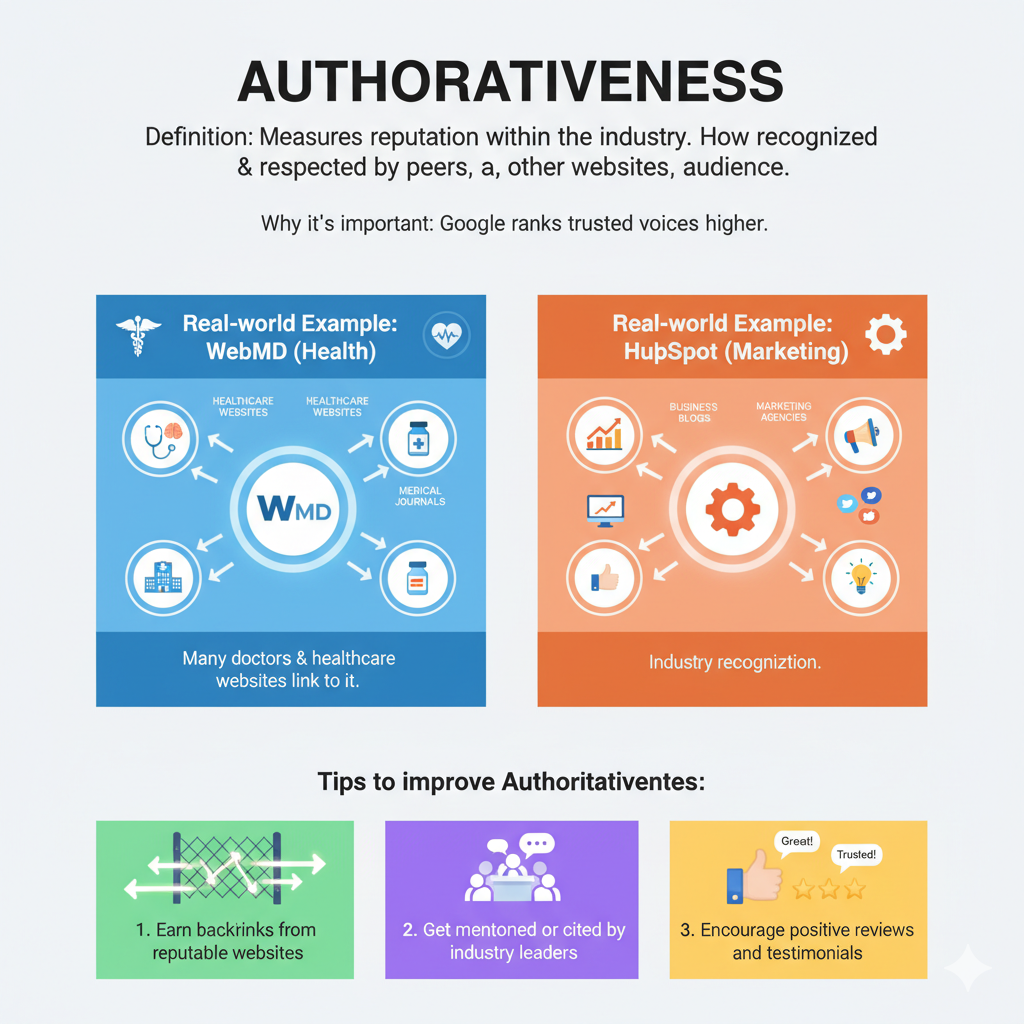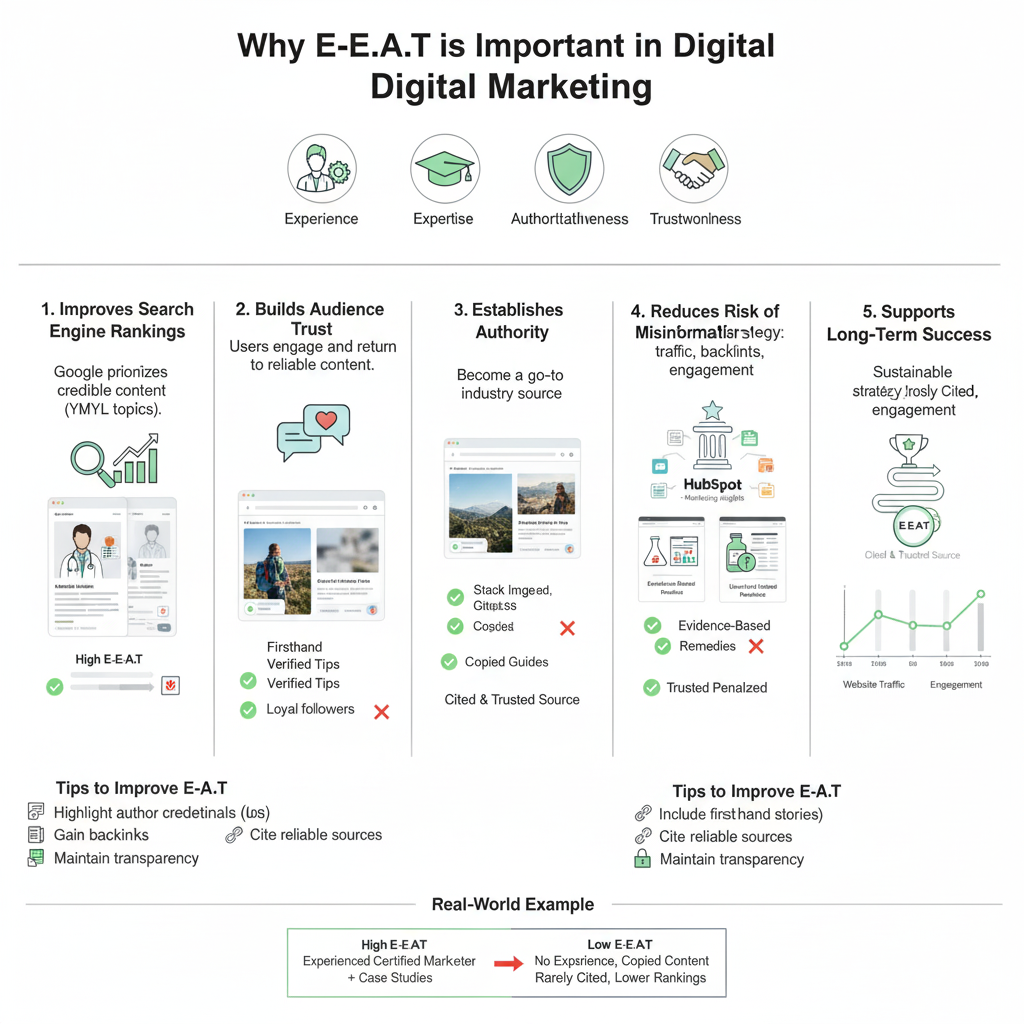
Digital marketing is no longer just about creating content and hoping it ranks. Google has become increasingly sophisticated in evaluating content quality and website credibility. One of the most important frameworks guiding this evaluation is E-E-A-T, which stands for Experience, Expertise, Authoritativeness, and Trustworthiness. Understanding and applying E-E-A-T is essential for improving search engine rankings, especially for sites dealing with sensitive topics like health, finance, or law, often referred to as YMYL (Your Money or Your Life) topics.
This guide breaks down each element of E-E-A-T, with real-world examples, tips, and practical Q&A to h
elp marketers, content creators, and business owners optimize their websites effectively.
What is E-E-A-T?
E-E-A-T is a concept introduced in Google’s Search Quality Rater Guidelines (updated in 2022). It helps Google evaluate whether a website or content piece is:
- Created by someone with experience and knowledge in the topic
- Authoritative in the subject area
- Reliable and trustworthy
Why it matters: High E-E-A-T content is more likely to rank higher in search results because it signals quality, credibility, and reliability to both Google and users.
Key Note: The first “E” — Experience — was added in 2022 to highlight the importance of first-hand knowledge.
Breaking Down E-E-A-T
Experience

Definition: Experience refers to the first-hand knowledge or practical involvement the content creator has with the topic. Google values content created by someone who has actually done or experienced what they are writing about.
Why it’s important: Users trust content more if the author has real-world experience. For example, someone reviewing trekking trails in Kerala is more credible if they have personally hiked those trails, compared to someone writing based purely on online research.
Real-world Example:
- A travel blogger who writes “Top 10 Trekking Trails in Munnar” from personal visits.
- A medical patient sharing their personal experience managing diabetes.
Tips to improve Experience on your content:
- Include personal stories, case studies, or firsthand reviews.
- Mention years of experience or projects handled.
- Add images, videos, or documentation proving your involvement.
2. Expertise

Definition: Expertise is the knowledge, skill, or qualifications of the content creator in a particular field. Google prefers content written by someone recognized as an expert.
Why it’s important: Expertise shows that the content is accurate, reliable, and informative.
Real-world Example:
- Dr. P. E. Abraham writing a blog about chronic diseases. His medical qualifications and years of practice make him an expert.
- A certified digital marketer writing a guide on Google Ads or Meta Ads.
Tips to show Expertise:
- Display your credentials (degrees, certifications, awards).
- Include references to your published works or media mentions.
- Provide detailed explanations, backed by data or research.
3. Authoritativeness

Definition: Authoritativeness measures the reputation of the content creator or website within the industry. It’s about how recognized or respected you are by peers, other websites, or your audience.
Why it’s important: Google ranks websites higher if they are considered a trusted voice in the field.
Real-world Example:
- WebMD is authoritative in health content because many doctors and healthcare websites link to it.
- HubSpot is authoritative for marketing content due to its industry recognition.
Tips to improve Authoritativeness:
- Earn backlinks from reputable websites.
- Get mentioned or cited by industry leaders.
- Encourage positive reviews and testimonials.
4. Trustworthiness

Definition: Trustworthiness refers to the reliability, transparency, and honesty of the content and website. It ensures users feel confident in using your information or services.
Why it’s important: If users cannot trust your website, they won’t engage, and Google sees this as a sign of low-quality content.
Real-world Example:
- Websites with HTTPS, clear contact info, privacy policies, and verified authors are considered trustworthy.
- Wikipedia maintains trust by citing reliable sources and being transparent about edits.
Tips to improve Trustworthiness:
- Display author bios and credentials clearly.
- Include citations and references to authoritative sources.
- Maintain a secure website (HTTPS) and clear policies.
- Avoid misleading or false claims.
E-E-A-T in Action: Real World Examples
| Website | E-E-A-T Element | Explanation |
| WebMD | Expertise & Authoritativeness | Written by medical professionals; widely cited by other health websites |
| TripAdvisor | Experience | Reviews come from travelers with firsthand experiences |
| HubSpot | Authoritativeness | Recognized as a leading source in marketing, widely referenced |
| Wikipedia | Trustworthiness | Transparent citations, community oversight, and clear editorial standards |
Tips to Apply E-E-A-T in Your Website
- Highlight the author’s experience and qualifications
- Include first-hand insights or case studies
- Cite credible sources and references
- Gain mentions or backlinks from trusted websites
- Maintain website transparency (contact info, policies, HTTPS)
- Update content regularly to ensure accuracy
FAQs on E-E-A-T
Q1: Is E-E-A-T a ranking factor?
A: E-E-A-T is not a direct ranking factor, but it strongly influences Google’s evaluation of content quality, which affects rankings.
Q2: Does E-E-A-T only matter for health or finance sites?
A: It matters most for YMYL topics, but applying E-E-A-T principles improves credibility for any niche.
Q3: How can small websites improve E-E-A-T?
A: Focus on building expertise (show credentials), gain backlinks, publish high-quality content, and maintain trust signals like clear policies.
Q4: Can AI content meet E-E-A-T standards?
A: Only if it is reviewed, verified, and supplemented by real experience or expert knowledge. AI alone does not provide expertise or experience.
Why E-E-A-T is Important in Digital Marketing

In today’s competitive online landscape, simply creating content is not enough. E-E-A-T (Experience, Expertise, Authoritativeness, and Trustworthiness) plays a crucial role in how Google evaluates your website and how users perceive your brand. Here’s why it matters:
1. Improves Search Engine Rankings
Google prioritizes content that demonstrates high-quality, credible, and trustworthy information. By implementing E-E-A-T principles, your website is more likely to rank higher in search results, especially for sensitive topics like health, finance, or legal advice (also called YMYL – Your Money or Your Life content).
Example:
- A medical blog written by a certified doctor with real patient experience will outrank generic health articles written by someone without medical knowledge.
2. Builds Audience Trust
Users are more likely to engage, share, and return to your website if they trust the information. E-E-A-T ensures that your content is reliable and accurate, which builds long-term credibility with your audience.
Example:
- A travel website providing firsthand experiences and verified tips gains more reader loyalty than one copying generic travel guides.
3. Establishes Authority in Your Niche
Demonstrating expertise and authoritativeness positions your brand as a go-to source in your industry. This not only boosts website traffic but also attracts opportunities like partnerships, collaborations, and media mentions.
Example:
- HubSpot is widely cited in marketing blogs because it consistently shares expert insights, making it an authoritative source.
4. Reduces Risk of Misinformation
With increasing concerns about fake news, misleading advice, and unverified content, E-E-A-T helps ensure your content is accurate, transparent, and credible. This protects your brand reputation and maintains user confidence.
Example:
- Health websites that provide evidence-based recommendations rather than unverified remedies maintain trust and avoid penalties from search engines.
5. Supports Long-Term Digital Marketing Success
Implementing E-E-A-T principles is not just about short-term SEO gains—it’s a sustainable strategy. Content that demonstrates experience, expertise, authority, and trustworthiness continues to attract traffic, backlinks, and engagement over time.
Tips to Improve E-E-A-T in Digital Marketing:
- Highlight author credentials and experience.
- Include first-hand stories, case studies, or practical insights.
- Gain backlinks and mentions from credible websites.
- Cite reliable sources and data to support claims.
- Maintain transparency with contact info, privacy policies, and secure websites.
Real-World Example
Consider two blogs about digital marketing strategies:
- Written by an experienced certified marketer with case studies → High E-E-A-T → Trusted, cited, and shared.
- Written by someone without marketing experience, copying content from other sources → Low E-E-A-T → Less trusted, rarely cited, lower rankings.
Conclusion
E-E-A-T is the backbone of content quality in modern SEO. By demonstrating Experience, Expertise, Authoritativeness, and Trustworthiness, websites can rank higher, gain audience trust, and provide real value.
Applying these principles involves showcasing real-world knowledge, credentials, reputation, and reliable practices. Whether you run a blog, an e-commerce store, or a professional service website, focusing on E-E-A-T ensures your content is credible, engaging, and aligned with Google’s standards.